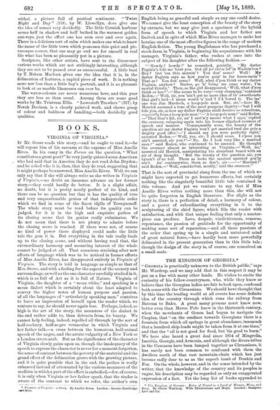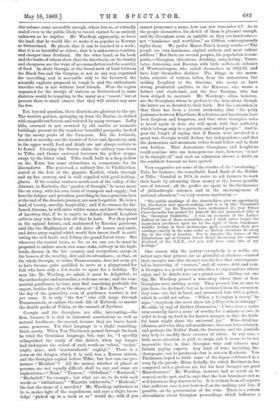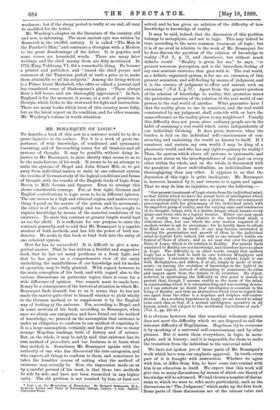THE KINGDOM OF GEORGIA.*
"GEORGIA is practically unknown to the British public," says Mr. Wardrop, and we may add that in this respect it may be put on a line with many other lands. He wishes to excite the curiosity of his fellow-countrymen, who, while they know or believe that the Georgian ladies are fair to look upon, confound both sexes with the Circassians. We should have thought that by this time the trading world at all events has some definite idea of the country through which rims the railway from Batoum to Baku. A great many persons must know now, better even than Marco Polo knew in the thirteenth century, when the merchants of Genoa had begun to navigate the Caspian, that "on the confines towards Georgiana there is a fountain from which oil springs in great abundance, insomuch that a hundred ship-loads might be taken from it at one time," and that the "oil is not good for food, but 'tie good to burn." We have also heard a great deal since 1854 of Mingrelia, Imeritia, Georgia, and Armenia, and although the divers tribes in the Caucasus have been lumped together as Circassians, it has surely not been common to confound with them the dwellers south of that vast mountain-chain which has just become sadly dear to its as the superb tomb of Donkin and Fox. On the whole, however, and in the sense intended by the writer, that the knowledge of the country and its peoples is vague, his description may be regarded as only an exaggerated expression of a fact. Yet the long list of books appended to • The Kingdom of Georgia : Notes of Travel in a Land of Woman. Wine and Sony. By Oliver Wardrop. With Illustrations and Maps. London : Sampson Low and Co. this volume, some accessible enough, others less so, or virtually sealed even to the public likely to travel, cannot be so entirely unknown as he implies. Mr. Wardrop, apparently, so loves the land, that he would like to make it as popular as Norway or Switzerland. He pleads that it can be reached in a week ; that it is as beautiful as either; that it is unknown to tourists, and cheaper than Scotland. On the other hand, as his book and the books of others show, that the drawbacks on the beauty and cheapness are the want of accommodation and the scarcity of food. In short, Georgia, or the broad neck of land between the Black Sea and the Caspian, is not in any way organised for travelling, and is accessible only to the favoured, the scientific explorer prepared to rough it, and the enthusiastic traveller who is not without local friends. Were the region organised for the receipt of visitors as Switzerland is, some districts would be tempting to the many as a "resort," but at present there is small chance that they will attract any save the few.
Yet, beyond question, these districts are glorious to the eye. The western portion, springing up from the Euxine, is clothed with magnificent forests and watered by many streams. Lofty hills, crowned or not crowned by old castles or monastic buildings, present to the wanderer beautiful prospects, backed by the snowy peaks of the Caucasus. But the lowlands, wooded or marshy, are the haunts of fever and dysentery, and, in the upper world, food and drink are not always certain to be found. Crossing the Suram chain, the railway runs down to Tiflis, and thence eastward traverses the yellow steppe, swept by the bitter wind. Tiflis itself, built in a deep hollow on the Kura, has some attractions to compensate for its discomforts. The post-road, a military line, to Vladikavkas, seated at the foot of the gigantic Kasbek, winds through and up fine scenery, and is well supplied with good halting- places. If the tourist ventures north-east of the valley of the Alazana, in Kachetia, the "garden of Georgia," he must move like an army, with his own train of transport and supply ; but here the fatigue and privation, providing he has a generous host at the end of the desolate journey, are soon forgotten. He is in a land of beauty, novelty, hospitality; and if he crosses the far- famed Alazana, he will enter wilder scenes and have the luxury of knowing that, if he is unable to defend himself, Lesghien robbers may take from him all that he hath. For they prowl in the upland forests, and, undeterred by Russian garrisons, raid like the Highlanders of old, drive off horses and cattle, and drive away capital which would fain invest itself in culti- vating the rich lands and felling the grand forest trees. But wherever the tourist turns, so far as we can see, he must be prepared to endure much, run some risks, robbery in the high- lands, disease in the low country, and everywhere, except in the houses of the wealthy, dirt and its attendants ; so that, on the whole, Georgia, or rather Transcaucasia, does not seem yet to have become quite qualified to serve as a playground for folk who have only a few weeks to spare for a holiday. To men like Mr. Wardrop, we admit, it must be delightful ; to the arclnpologist and naturalist, a welcome arena ; and the com- mercial gentleman, in time, may find something profitable for export, besides the oil on the shores of "ii Mar di Bacu." But the day of the generality, even of gentlemen tourists, is not yet come. It is only "the few" who will range through Transcaucasia, or endure the rude life of Kabarda, to master the double peaks of Ushba, or the summit of Dychtau.
Georgia and the Georgians are alike interesting,—the first, because it is rich in historical associations as well as natural loveliness ; the second, because they are brave, hand- some, generous. Yet their language is a slight stumbling- block, surely. When Von Thielmann passed through the land, he tried the Grusinian language, but, says he, "I speedily relinquished the study of this dialect, when my tongue had undergone the ordeal of such words as rchwa," tzchrii ' (eight, nine), and otzchmodaatti ' (eighty)." There is a town on the Aragva, which, it is said, was a Roman station, and the Georgian capital before Tiffis ; but how can one pro- nounce " Mtzkhet " P All the names, whether of places or persons, are not equally difficult, shall we say, and some are euphonious,—" Nina," "Tamara," 66 Orbeliani," " Rustaveli," " Maphabeli," for example ; but what are we to do with such words as " tsklimknari," " Khartlis tzkhovreba," " Rtsheuli," the last the name of a novelist P Mr. Wardrop, enthusiast as he is, makes light of the impediment, and says a slight know- ledge "picked up in a week or so would do ; still, if you
cannot pronounce a name, how can you remember it P As to the people themselves, his sketch of them is pleasant enough, and the Georgians seem as amiable as they are handsome,— not "handsome and worthless," as Gibbon contemptuously styles them. We prefer Marco Polo's hearty words,—" The people are very handsome, capital archers, and most valiant soldiers." But there are several peoples, the population is com- posite,—Georgian, chivalrous, drinking, song-loving ; Turco- tatar, Armenian, and Russian, with little well-to-do colonies of Wurtembergers, who exiled themselves in 1812-13, and have kept themselves distinct. The fringe in the moun- tains consists of various tribes, from the industrious but raiding Lesghien to the Ossetine, who seems to have strong prudential qualities, to the Khevsur, who wears a helmet and chain-mail, and the free Suanian, who has been obliged to succumb. Mr. Wardrop's allies, however, are the Georgians, whom he prefers to the Armenians, though
the latter are so devoted to their faith. But his contention is that there has been a recent awakening, that "the petty jealousies between Khartlians,Kachetians, and Imeritians, have been forgiven and forgotten, and that when Georgia's voice is heard again in Asia, she will speak with that authority which belongs only to a patriotic and united people." And he goes the length of saying that if Russia were involved in a
great war, Georgia would declare her independence, and that the Armenians and mountain tribes would follow suit in their own fashion. That Armenians, Georgians, and Lesghiens could combine into one homogeneous state, however, "is not to be thought of," and such an admission throws a doubt on the confident forecast we have quoted.
Very suggestive are some of the results of the " awakening." Take, for instance, the remarkable Land Bank of the Nobles at Tiffis, "founded in 1874, in order to aid farmers to work their lands by advancing them money at the lowest possible rate of interest ; all the profits are spent in the furtherance of philanthropic schemes, and in the encouragement of national education,"—a very curious institution :— "The public meetings of the shareholders give an opportunity for discussion and speech-making, and it is in this Gruzinskii Parliament' (as the Russians have nicknamed it), that Prince Chavchavadze has gained for himself the not unmerited title of the Georgian Gambetta.' I was an occupant of the Ladies' Gallery at one of these assemblies, and I shall never forget the impression produced upon me by the sight of these handsome, warlike Asians in their picturesque garb, conducting their pro- ceedings exactly in the same order as British investors do every day in the City of London. Try to imagine the heroes of the Elizabethan age at Cannon Street Hotel discussing the current dividend of the S.E.R., and you will have some idea of my feelings."
One reason why the gentry—everybody is a noble, one writer says that princes are as plentiful as chickens—turned their energies into this channel was the fact that extravagance led to borrowing of "usurers," and, of course, debt and ruin.
A Georgian is a jovial person who likes to enjoy and see others enjoy, and he drinks wine on a grand scale. Riding out one day, Mr. Wardrop passed a wine-shop where three or four Georgians were making merry. They pressed him at once to join them; he declined ; but as he returned from his excursion, they came out, hat in hand, and presented him with a goblet, which he could not refuse. "When a Georgian is merry," he says, "everybody else must share his jollity, or he is unhappy."
He adds, by way of further illustration, "I have seen a squire
unnecessarily leave a scene of revelry for a minute or two, in order to heap up food in his horse's manger, so that the faith- ful beast might share the universal joy." Wine-drinking, idleness, and what they call munificence, have not been salutary, and perhaps the Nobles' Bank, the literature, and the journals may help to modify these excesses of virtue. In any case, a little more attention is paid to crops, and it seems to be not impossible that, in time, Georgian wine and tobacco may furnish paying exports. Any kind of wine, including fine champagne, can be produced—but is not—in Kachetia. Von Thielraann hoped to drink some of the liquor celebrated in a song by the pseudo Mirza Schaffy, for which Rubinstein has composed such a glorious air, but his host brought out good Idarcobrunner ! Mr. Wardrop, however, had as much as he wanted on the spot, and he says that the best brands are not so well known as they deserve to be. It is evident from all reports that sufficient care is not bestowed on the making, and less, if possible, on the preservation of the wine. There is a certain slovenliness about Georgian proceedings which indicates a
weakness ; but if the sleepy period is really at an end, all may be modified for the better.
Mr. Wardrop's chapter on the literature of the country, old and new, is informing. The most ancient epic was written by Rustaveli in the twelfth century. It is called "The Man in the Panther's Skin," and contrasts a Georgian with a Moslem to the great disadvantage of the latter. It is popular, and some verses are household words. There are many later writings, and the chief among them are duly mentioned. In 1712, King Vakhtang VI. did a remarkable thing. He became a printer and publisher, and "issued the chief poems and romances of the Tamarian period at such a price as to make them attainable to all his subjects." Among the living writers is a Prince Ivane Machabeli, who edits or edited a journal, and has translated some of Shakespeare's plays. "These always draw a full house, and are thoroughly appreciated." In fact, England is for the moment, it seems, at a sort of premium in Georgia, which looks to the westward for light and instruction. There are many books which treat of this country more fully, but as the latest report on its condition, and for other reasons, Mr. Wardrop's volume is worth attention.




































 Previous page
Previous page